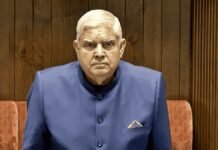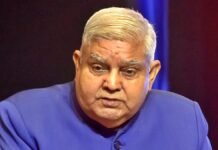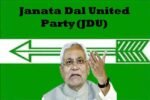
Key Points
- Rajya Sabha MP Kapil Sibal has strongly criticized Vice President Jagdeep Dhankhar’s remarks on the judiciary, calling them “unconstitutional” and politically motivated.
- Sibal emphasized that the Speaker and Rajya Sabha Chairman must remain neutral and not act as party spokespersons, warning that such conduct undermines the dignity of the office.
- The controversy arose after VP Dhankhar questioned the Supreme Court’s power to set deadlines for the President on state bills and likened Article 142 to a “nuclear missile” against democratic forces.
- The Supreme Court recently set a precedent by mandating a three-month deadline for the President to decide on bills reserved by governors, curbing indefinite delays and reinforcing judicial review.
- Sibal and other opposition leaders argue that the judiciary’s powers are constitutionally enshrined and essential for upholding checks and balances in democracy.
New Delhi: Senior advocate and Rajya Sabha MP Kapil Sibal on Friday launched a scathing attack on Vice President Jagdeep Dhankhar for his recent remarks targeting the judiciary, describing them as “unconstitutional” and unprecedented in the history of the Rajya Sabha. Sibal expressed deep concern over what he called a politically tinted position from the chair, warning that such statements risk eroding the dignity and neutrality expected from the presiding officers of Parliament.
Sibal stressed, “Everyone knows that the Lok Sabha Speaker’s chair is in the middle. He is the Speaker of the House, not the Speaker of any one party. The same applies to the Rajya Sabha. You are at an equal distance between the Opposition and the ruling party. No speaker can be a spokesperson of any party. If it seems so, the dignity of the chair gets reduced”.
VP Dhankhar’s Remarks Ignite Political and Legal Firestorm
The controversy erupted after Vice President Dhankhar, during an address to Rajya Sabha interns, criticized the Supreme Court’s recent directive that set a three-month deadline for the President to decide on state bills referred by governors. Dhankhar questioned the judiciary’s authority to impose such timelines, arguing that it amounted to the court acting as a “super parliament” and likened the use of Article 142 to a “nuclear missile” against democratic forces.
Dhankhar also raised concerns about the process for prosecuting judges and the immunity granted to them, sparking further backlash from opposition leaders and legal experts who accused him of undermining judicial independence.
Supreme Court’s Landmark Ruling: Timelines and Judicial Review
The Supreme Court’s April 8 judgment, delivered by Justices J.B. Pardiwala and R. Mahadevan, was a response to prolonged delays by the Tamil Nadu Governor in assenting to state bills. The court ruled such delays “illegal and unconstitutional,” clarified the limits of gubernatorial discretion, and, for the first time, set a three-month deadline for the President to act on bills reserved by governors. The ruling also expanded the scope for judicial review, allowing state governments to seek court intervention if these timelines are not met.
The court emphasized that its interpretation did not amend the Constitution but was necessary to prevent indefinite stalling of legislative processes and to uphold constitutional urgency.
Sibal: Judiciary’s Powers Are Constitutionally Mandated
Kapil Sibal defended the judiciary’s use of Article 142, which empowers the Supreme Court to pass any order necessary to ensure “complete justice.” He pointed out that the President is a “titular head” acting on the advice of the Cabinet and has no personal discretion in such matters. Sibal argued that the government often criticizes the judiciary only when verdicts are unfavorable, but cites the Supreme Court’s authority when it suits their interests.
He asserted, “If the executive doesn’t do its job, the judiciary has to intervene. The Constitution has given this power to the Supreme Court to deliver complete justice”.
Opposition Backs Judiciary, BJP Defends VP
Opposition parties, including Congress, TMC, and DMK, rallied behind Sibal, calling Dhankhar’s remarks “objectionable,” “unethical,” and bordering on contempt of court. They emphasized that no constitutional authority is above checks and balances and that the judiciary’s role is vital for safeguarding democracy.
The BJP, however, defended the Vice President, accusing the opposition of hypocrisy and reiterating the need for respect for constitutional offices.
The clash between constitutional authorities has reignited a national debate on the balance of powers, the role of the judiciary, and the essential need for neutrality among parliamentary presiding officers. As the Supreme Court’s landmark ruling sets new precedents, the coming days are likely to see further legal and political challenges over the separation of powers in Indian democracy.


















































